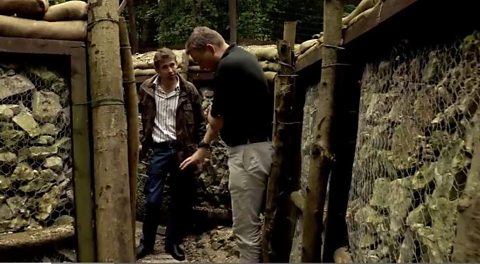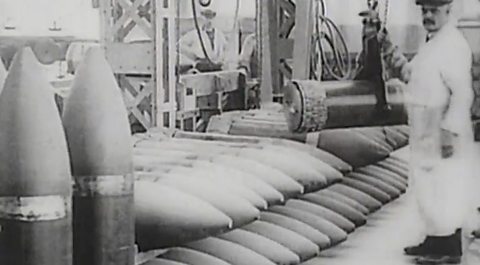DAN SNOW:Hello, I'm Dan Snow. It's easy to forget when considering World War One that those involved really did come from all over the world, not just the USA, which didn’t enter the war until April 1917, or nations of Europe, where the conflict mostly played out.
DAN SNOW:Britain was able to draw its soldiers not just from home, but from the overseas countries that made up the British Empire like Australia and New Zealand. But here we're looking at one particularly adept group of fighters, the Sikh soldiers of the British Indian Army. The important role they played and how they were treated once the war had been won.
NARRATOR:By the early 20th Century, the Sikhs' homeland Punjab was providing over half the troops used in the British Indian Army, despite Sikhs making up just 1% of the country's population. And with the onset of the First World War, Britain found it had a useful new source of war conscripts.
HISTORIAN:British Army went across to France in 1914, it took a huge number of casualties. The only army that could reinforce it, the only army that was almost as big as the British Army and was regular and properly trained and experienced was the British Indian Army.
HISTORIAN:And very, very early, as early as September 1914, Indian troops were moving from India by sea over to France, coming up and taking their place in the line on the Western Front.
NARRATOR:For many Sikhs, bravery on the battlefield was in itself an honourable act. In a letter home, a soldier fighting on the Somme wrote, "It is quite impossible that I should return alive. Don't be grieved at my death because I shall die arms in hand, wearing the warriors clothes. This is the most happy death that anyone can die."
INTERVIEWEE:Well by the sheer numbers of the Sikhs that fought I mean, 100,000 men is a great boost to any campaign. And on top of it, the bravery that these Sikh soldiers showed. Some campaigns at some battlefields - the complete regiments were exterminated because they fought till the end.
INTERVIEWEE:One particular story of a German regiment seeing Sikhs who were fighting against them, running out of ammunition and all of a sudden, taking out their swords and marching towards them. You know, in a rage. So they actually commended this courage that they saw.
INTERVIEWEE:The news of the Sikh soldiers fighting in the East or the Western Front was covered by all the newspapers worldwide. French papers and American papers - mainly to show their flamboyant and colourful uniforms as well and appearance.
INTERVIEWEE:But at the same time showing that the Sikh soldiers had rallied and come to fight under the banner of the British Empire.
INTERVIEWEE:We've got some lovely images showing them marching through the streets and the local French crowds greeting them, throwing flowers. And this wasn’t just because this was an oriental figure marching through the streets of Paris but really there was genuine love and genuine affection that these Sikh soldiers had come to save them.
HISTORIAN:The outcome of the First World War, the early stages of it, certainly without the Indian army contribution, and of course Sikhs were a large part of that contribution, I think the war might have been very, very different.
HISTORIAN:The Indian Army contingence arrived during the First Battle of Ypres, just in time and in just enough numbers to block the gaps. They certainly saved the British from what might have been an embarrassing retreat back to the Channel ports.
DAN SNOW:So, the Sikhs undeniably played a crucial role, but many felt their contribution was forgotten far too quickly.
HISTORIAN:Certainly in the award of gallantry medals, the Sikhs were certainly over-represented, not only in Victoria Crosses but in other gallantry medals as well.
NARRATOR:But any Sikh soldiers who'd hoped that their loyalty during the war would be rewarded with greater autonomy back in their homeland were in for a shock.
NARRATOR:Within months of the war's end, Britain reverted Punjab back to martial law under a repressive regime which reached its nadir in April 1919, in the Sikhs' holiest city.
NARRATOR:British military orders led to the shooting of 1,500 unarmed men, women and children at Jallianwala Bagh for taking part in a peaceful demonstration against British rule in what became known as the 'Amritsar Massacre.'
INTERVIEWEE:They'd fought as a voluntary force for another country, for a campaign which didn’t affect them and this is how they were treated. So there was betrayal and they felt cheated.
DAN SNOW:Even a century later, there's anger over how Britain behaved in the months imminently following the Great War's end.
DAN SNOW:In 2013, the then prime minister, David Cameron, visited the site of the Amritsar Massacre and called it, "A deeply shameful act that should never be forgotten." But there has never been a formal apology from Britain, despite plenty of demands for one.
DAN SNOW:Another sign that those events from all those years ago still have an impact and resonate today.
Video summary
Indian Sikhs played a key role in the British army during World War One.
Indian troops started arriving on the Western Front from September 1914.
Sikh soldiers fought bravely, receiving world wide news coverage of their involvement in the war.
The Sikh troops played a crucial role in the first battle of Ypres, yet their contribution was not widely rewarded after the war.
Britain imposed martial law on Punjab, ultimately leading to the Amritsar massacre.
Many Sikh soldiers were left angry and let down by the British government.
Teacher Notes
Your students could be shown a world map showing colonial powers in 1900.
They could be asked to explain how having an empire might help countries fighting in World War One and whether colonies might want to help.
After watching this short film, they could write a speech by Gandhi explaining why the Indian people feel betrayed by the British government and the changes they want to see in India.
This short film will be relevant for teaching history at KS3 and KS4/GCSE in England, Wales and Northern Ireland.
Also at 3rd Level, 4th Level, National 4/National 5 and Higher in Scotland.
How challenging was the life of a pilot in World War One? video
James May looks at the dangers and challenges facing pilots in World War One.

What were trench conditions like in World War One? video
Saul David looks at how British soldiers coped with trench conditions in World War One

How did Britain meet demands for weapon production in World War One? video
Saul David on how Britain struggled to produce the weapons to supply the army in World War One.
